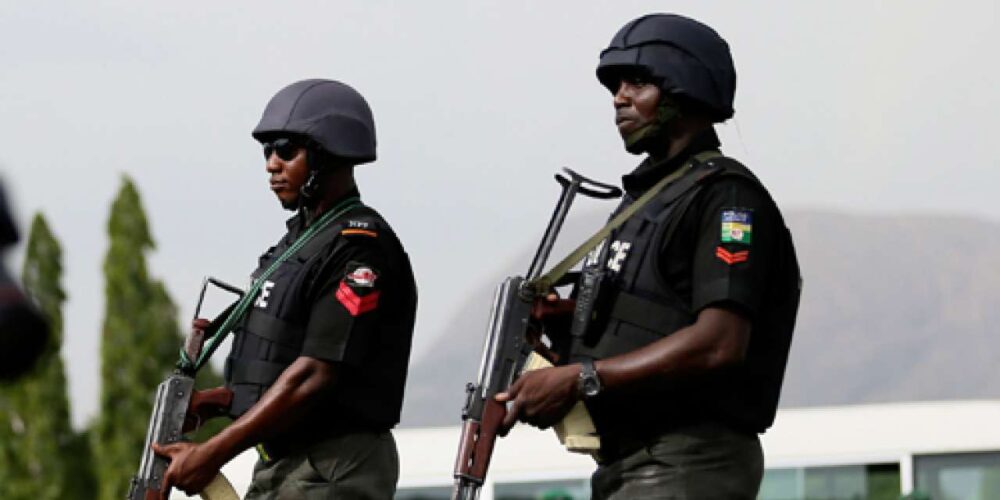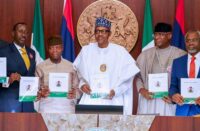8 min read
In the scheme of what is “security” and/or “national security”, it is the crisis and conflict outcome that is “security” and/or “national security’s” essence in Nigeria’s undefined, uncharted and ungoverned security space of the last twenty-three years.
For the ensuing orchestrated crisis and conflict, the country, in the name of “security” and/or “national security”, must pull all the stops, to respond to the development, including depleting the treasury. This is the narrative that constitutes “security” in Nigeria. In the absence of any legislated security policy, under democracy, the socialised and/or indoctrinated narrative of the military, intelligence and law enforcement perspective of security subsist, to cover the vacuum. Nature abhors vacuum. In terms of the idea called SECURITY or SECURE, under representative rule system, there is a vacuum since 1999.
The SYMPTOMS and not the CAUSES is treated as “security”.
The SYMPTOMS which is the responsibility of the military, intelligence and law enforcement, as agencies saddled with specific tasks, within the enabling laws, tasks described as defence, intelligence and law/order maintenance in these laws and not security, now takes responsibility for the political task of security or secure.
The CAUSES which is the responsibility of the political/governing authority, saddled with governing everything, under the Constitution of the country, and therefore charged with security or secure of everything either did not know of this responsibility and/or chose to abdicate and/or delegate this responsibility to agencies under its watch to carry out.
This is Nigeria’s reality since the enthronement of representative rule in 1999. It is Nigeria’s enveloping reality effectively beginning in 2007, when the transition within transition began and when this lacuna on security which birthed national security on the one hand and on the other hand the contradiction between security and defence hit the headline of Nigeria’s political space.
I am particular about defence/military because the narrative of the prevailing “security” and/or “national security” which successfully failed and is failing principally affects the role of the military and was planted when the military was the governing authority. The inclusion of intelligence and law enforcement complete the circle as the military, intelligence and law enforcement (MILE) which sees itself as defacto “security” and/or “national security” with representative rule underway in 1999 and effectively so beginning in 2007.
It was from 2007 that the political economy of “security” and/or “national security” came into being. This unspoken informal association comprised the elites of politics (elected and appointed) and those of the military, intelligence and law enforcement that found new utilitarian value for “security” and/or “national security” in the scheme of their governance. The meeting called by the commander-in-chief, with the leadership of the MILE after the Kuje Prison Attack, represented subset of this informal grouping, attempting to aggregate their positions post Kuje Prison Attack.
There was no pronouncement after the meeting. One plausible explanation would be their desire to keep operational – ala “security” the Nigerian way – details to their chest. Another unspoken explanation was to be seen to be doing something as time intervened and memories lapsed amongst most Nigerians.
However, while the top echelons were at it in their political economic scheming on “security” and/or “national security”, it is important to distinguish the Ministry of Defence (the political wing), Defence Headquarters/the MILE High Command (the professional/managerial wing) on the one hand and the Junior/Middle Rank and Ordinary Rank and File on the other hand. The latter, like most Nigerians, represent the hardworking and conscientious men and women taking their tolls, in pains and deaths, in their frontline positions, in the unfolding drama, of “security” and/or “national security”, presided over by the former.
The political/governing authority did not comprehend their role enough to distinguish between security and defence or what I call the umbrella/forest metaphor for security and the tree metaphor for defence. They have been bamboozled by international practices that concealed the umbrella/forest essence of security with the outward appearance of the tree or MILE as security. Not even Mr President and his lieutenants could discern the FOREST and TREE essence, in his three point agenda of securing the country, revamping the economy in order to create opportunity for youths and fighting a relentless war against corruption.
Of the three point agenda, the forest/umbrella is the economy or “revamping the economy in order to create opportunity” not just for the youths only but every demographic group in Nigeria. This is security or secure. It is the consistent and persistent pursuit of this by the government in the short, medium and long term that will, in the long run, constitute national security. This is the tasks of the political/governing authority at all levels. This is what is SECURITY or SECURE.
It is the absence and/or inadequacy of economic opportunities, for most Nigerians, which gave birth and/or is giving birth to crisis and conflict everywhere in the country; it is in the rising inflation and in the spiralling out of control cost of living crisis and; thus feeding into the “securing Nigeria” aspect of the agenda. This is the reason for corruption of all types and thus the “fighting a relentless war against corruption” aspect of the agenda including and especially the Buhari corruption typology.
The Buhari Type Corruption primarily focused on the thefts of public funds by functionaries of previous governments. The Buhari Type ignored the ongoing thefts and re-thefts or re-looting of recovered monies and assets by functionaries of the present government. It is these thefts that oil the wheels of crisis and conflict, as they starved public services of funds, on the one hand and on the other hand the version of “security” and/or “national security” focusing on the symptoms. In the bid to stem the descent to anarchy which is rarely what the state/government make of it including subletting large swathes of areas for the exclusive control of bandits, the MILE persistently and consistently requested for more funds in order to contain the crisis and conflict in the polity.
Therefore crisis and conflict that informed the first of the three point agenda of “securing the country” would have been unnecessary if the economy was made to work for most Nigerians. Nigerians have been plunged into the worst of economic crisis ever of any recent administration and have been compelled to seek solace outside the cover of the state and government to eke out their miserable living.
We must note that it is not even the despair and desperation of most Nigerians, signified poignantly by Nigeria’s descent to the position of the poverty capital of the world, occasioned by the administration’s insensitivity in working the economy, in order to cater for their needs, which is the reason for crisis and conflict in the polity. Instead and as evident beginning in 2015, there is a political economy of crisis and conflict in the works by the political class alongside the MILE class orchestrating the state of sieges everywhere which serves their strategic political and pecuniary calculations of this their “security” and/or “national security”.
The stealing and re-stealing that is now the signature of this administration and most of its functionaries and which informed the agenda of fighting a relentless war against corruption would have been minimised to the barest minimum had the economy been made to work for most Nigerians. In spite of the efforts of the ministry of information and the presidential spokesperson, there is nothing going on that can be described as fighting any relentless war against corruption by this administration.
President Buhari never fought any battle let alone any war against corruption anytime in his entire public service career in Nigeria. It is part of what I called the hot airs surrounding his personality and his stewardship in Nigeria. The Buhari hot-airs were created partly by the removal of history from schools, the nostalgia of Buhari’s so-called past tough stance against ills, created amongst the numerous uninformed segments of the population across the country and the use of the social media to engineer and deploy revisionist tit bits history lessons for Nigerians’, in the lead up to the 2015 general elections.
President Muhammadu Buhari GCFR has had the chance to recast this persona, if indeed he ever lived them, with the mandate Nigerians so-called gave him in 2015 and 2019. The test case was his three point agenda and the reloaded Next Level three point agenda. He did not disappoint. He never lived this life and could not have recreated this life for most Nigerians beginning in 2015. There was never an agenda ab initio. The agenda was hurriedly compiled, as there was yawning policy gaps, in what his administration stood for, in terms of policies.
In the last seven years, every effort of the administration, in whatever sector, in the provision of services, by its functionaries, is directed towards justifying the opportunistic mindless thefts of funds ongoing. There is no relief in terms of creating opportunity for youths, let alone other Nigerians, in the sectoral development; there is no relentless fight against any corruption as corruption is the administration’s hallmark achievement whether the Buhari Type Corruption and/or the Transparency International Type or both and; as a result of the two above not working and in the spirit of the political economy of “security” and/or “national security” which ensure it is crisis and conflict incorporated everywhere, there is no securing the country.
The administration blended two strands of ingredient to oil its perspective of “security”. The first ingredient is the grand agenda of the unwieldy coalitions called the All Progressives Congress (APC) political class. I had argued somewhere that the only commonality of the motley disparate crowd constituting the APC was the quest for power and nothing else. Beyond this there was nothing that bonded them except to use the power to fleece the country of its resources. The APC’S grand theft agenda is supported by their MILE collaborators responsible for the narrative of “security” in the public space. The political class have no narrative of security of their own making. The second ingredient is the three point unworkable agenda that did not deliver on its promises.
These two ingredients more than the pains and deaths the APC’S lack of governance or the effective and efficient utilisation of human and material resources for the benefit of most Nigerians, powered the wheels of crisis and conflict for the sake of “security” and/or “national security”. Rising Inflation and spiralling cost of living crisis, as consequences of the ailing economy, for the partners, is secondary consideration in their diagnosis of what is and is not “security” and/or “national security”.
It is only if and when the economy is not working for most, if not all Nigerians, that this will result to crisis and conflict on the one hand and on the other hand corruptions or thefts in the public service. The first or the economy is the all encompassing stake that gives rise to other stakes. Without the economy, there will be no crisis and conflict and no corruption or thefts. The economy is political and thus the security or secure foundation is anchored on the economy for other stakes to thrive.
The second or crisis/conflict and corruption are the subsets technical/professional and subsectoral issues, arising from the state of the economy. The task of remediation begins at the level of the economy first prior to ending with the agencies of law enforcement and to some extent defence/military.
The SYMPTOMS and not the CAUSES are treated as “security” and/or “national security”. This is not reflective of the history, experience and reality (HER) of most Nigerians and democracy’s framework of what should be security and/or national security.
This, for the political class, is the quid pro quo, necessary for their survival and continuation, as a political class, in the scheme of governance and sharing the Nigerian cake and, in keeping the MILE relevant, in post military rule Nigeria.
Our Take: Nigerians have in recent times witnessed the worst security situations since its transition into representative government due to political factors and economic failure. Without a functional economy, there won’t be any crises as the economy serves as the foundation for security. Addressing insecurity requires a well-functioning economy to drive law enforcement agencies and defence/military.
About the Author(s): Prof. Adoyi Onoja teaches history courses at the undergraduate and graduate levels in the Department of History and security courses at the graduate level in the Security Studies Unit of the Institute of Governance and Development Studies, Nasarawa State University, Keffi. He can be contacted through onojaa@yahoo.com and on www.adoyionoja.org.ng













